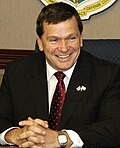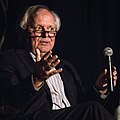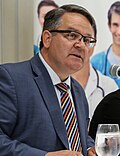| Portrait | Name
Electoral district
(Birth–Death) | Term of office | Party |
|---|
 | Andrew George Blair
MLA for York
(1844–1907) | 1879–1883 | | Liberal |
| Daniel Lionel Hanington
MLA for Westmorland
(1835–1909) | 1883–1892 | | Conservative |
 | Alfred Augustus Stockton
MLA for Saint John
(1842–1907) | 1892–1899 | | Conservative |
 | Douglas Hazen
MLA for Sunbury
(1853–1937) | 1899–1908 | | Conservative |
 | Clifford William Robinson
MLA for Westmorland
(1866–1944) | 1908–1912 | | Liberal |
 | Arthur Bliss Copp
MLA for Westmorland
(1870–1949) | 1912 | | Liberal |
| Louis-Auguste Dugal
MLA for Madawaska
(1869–1926) | 1912–1917 | | Liberal |
| James Alexander Murray
MLA for Kings
(1864–1960) | 1917–1920 | | Conservative |
| John Babington Macaulay Baxter
MLA for Saint John County
(1868–1946) | 1920–1921 | | Conservative |
| Charles Dow Richards
MLA for York
(1879–1956) | 1921–1925 | | Conservative |
 | Peter Veniot
MLA for Gloucester
(1863–1936) | 1925–1926 | | Liberal |
 | Allison Dysart
MLA for Kent
(1880–1962) | 1926–1935 | | Liberal |
| Frederick C. Squires
MLA for Carleton County
(1881–1960) | 1935–1939 | | Conservative |
| Hugh Mackay
MLA for Kings County
(1887–1957) | 1940–1948 | | Progressive Conservative |
| Hugh John Flemming
MLA for Carleton
(1899–1982) | 1949–1952 | | Progressive Conservative |
 | Austin Claude Taylor
MLA for Westmorland
(1893–1965) | 1952–1957 | | Liberal |
| Joseph E. Connolly
MLA for Gloucester
(1887–1973) | 1957–1958 | | Liberal |
| Louis Robichaud
MLA for Kent
(1925–2005) | 1958–1960 | | Liberal |
| Hugh John Flemming
MLA for Carleton
(1899–1982) | 1960 | | Progressive Conservative |
| Cyril Sherwood
MLA for Kings
(1915–1996) | 1960–1966 | | Progressive Conservative |
| Charles Van Horne
MLA for Restigouche
(1921–2003) | 1967 | | Progressive Conservative |
| Richard Hatfield
MLA for Carleton
(1931–1991) | 1967–1970 | | Progressive Conservative |
| Louis Robichaud
MLA for Kent
(1925–2005) | 1970–1971 | | Liberal |
| Robert J. Higgins
MLA for Saint John Centre
(born 1934) | 1971–1978 | | Liberal |
| Joseph Daigle
MLA for Kent North
(born 1934) | 1978–1981 | | Liberal |
| Doug Young
MLA for Tracadie
(born 1940) | 1982–1983 | | Liberal |
| Ray Frenette
MLA for Moncton East
(1935–2018) | 1983–1985 | | Liberal |
| Shirley Dysart
MLA for Saint John Park
(1928–2016) | 1985 | | Liberal |
 | Frank McKenna
MLA for Chatham
(born 1948) | 1985–1987 | | Liberal |
 | Camille Thériault [a]
MLA for Kent South
(born 1955) | 1987–1991 | | Liberal |
| Danny Cameron
MLA for York South
(1924–2009) | 1991–1995 | | Confederation of Regions |
| Ab Rector
MLA for Oromocto
(1934–2005) | 1995 | | Confederation of Regions |
| Greg Hargrove
MLA for York North
(born 1959) | 1995 | | Confederation of Regions |
| Bernard Valcourt
MLA for Edmundston
(born 1952) | 1995–1997 | | Progressive Conservative |
| Elvy Robichaud
MLA for Tracadie-Sheila
(born 1951) | 1997–1998 | | Progressive Conservative |
 | Bernard Lord
MLA for Moncton East
(born 1965) | 1998–1999 | | Progressive Conservative |
 | Camille Thériault
MLA for Kent South
(born 1955) | 1999–2001 | | Liberal |
| Bernard Richard
MLA for Shediac-Cap-Pelé
(born 1951) | 2001–2002 | | Liberal |
 | Shawn Graham
MLA for Kent
(born 1968) | 2002–2006 | | Liberal |
 | Bernard Lord
MLA for Moncton East
(born 1965) | 2006–2007 | | Progressive Conservative |
| Jeannot Volpé
MLA for Madawaska-les-Lacs
(born 1950) | 2007–2008 | | Progressive Conservative |
 | David Alward
MLA for Woodstock
(born 1959) | 2008–2010 | | Progressive Conservative |
 | Victor Boudreau
MLA for Shediac-Cap-Pelé
(born 1970) | 2010–2013 | | Liberal |
 | Brian Gallant
MLA for Kent
(born 1982) | 2013–2014 | | Liberal |
 | Bruce Fitch
MLA for Riverview | 2014–2016 | | Progressive Conservative |
 | Blaine Higgs
MLA for Quispamsis
(born 1954) | 2016–2018 | | Progressive Conservative |
 | Brian Gallant
MLA for Shediac Bay-Dieppe
(born 1982) | 2018–2019 | | Liberal |
| Denis Landry
MLA for Bathurst East-Nepisiguit-Saint-Isidore
(born 1957) | 2019–2020 | | Liberal |
 | Roger Melanson
MLA for Dieppe | 2020–2022 | | Liberal |
| Rob McKee
MLA for Moncton Centre
(born 1985) | 2022–2023 | | Liberal |
 | Susan Holt
MLA for Bathurst East-Nepisiguit-Saint-Isidore
(born 1977) | 2023–2024 | | Liberal |
 | Glen Savoie
MLA for Saint John East
| 2024–present | | Progressive Conservative |




















